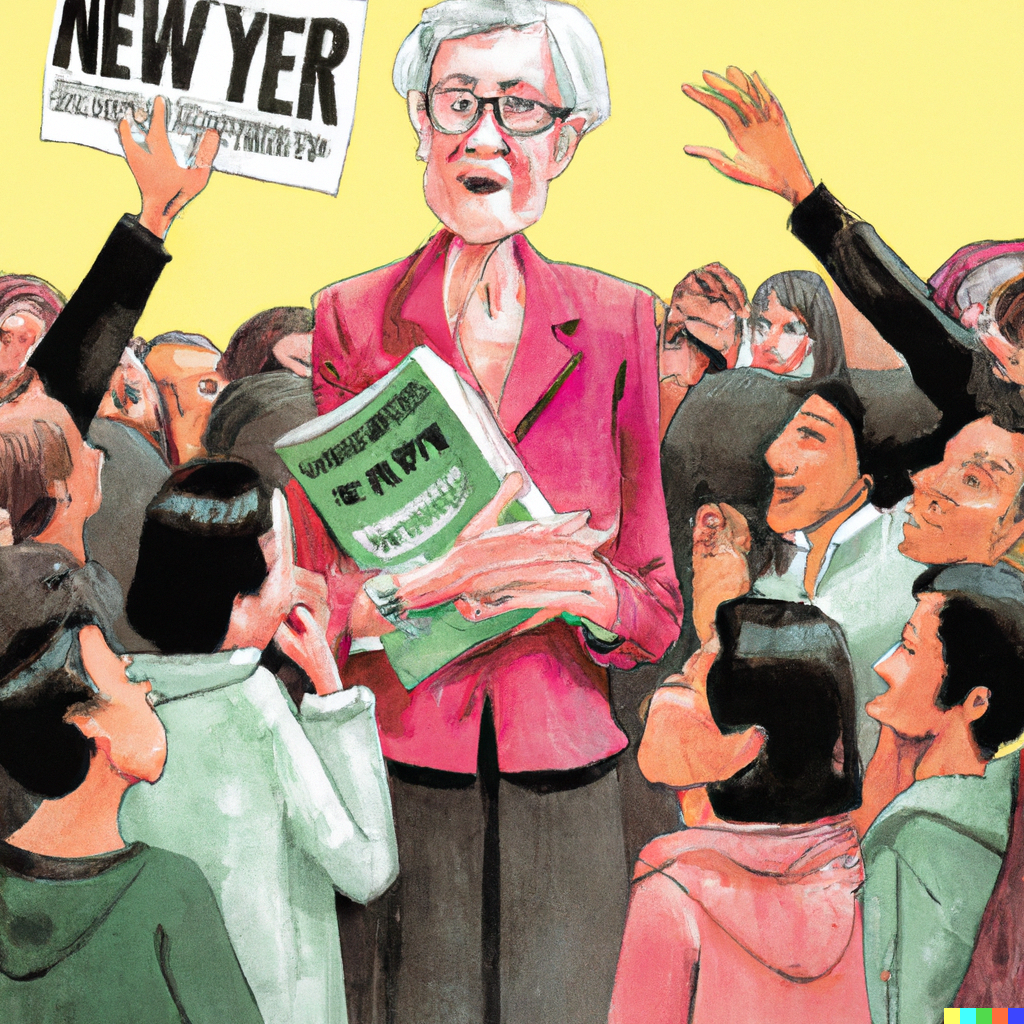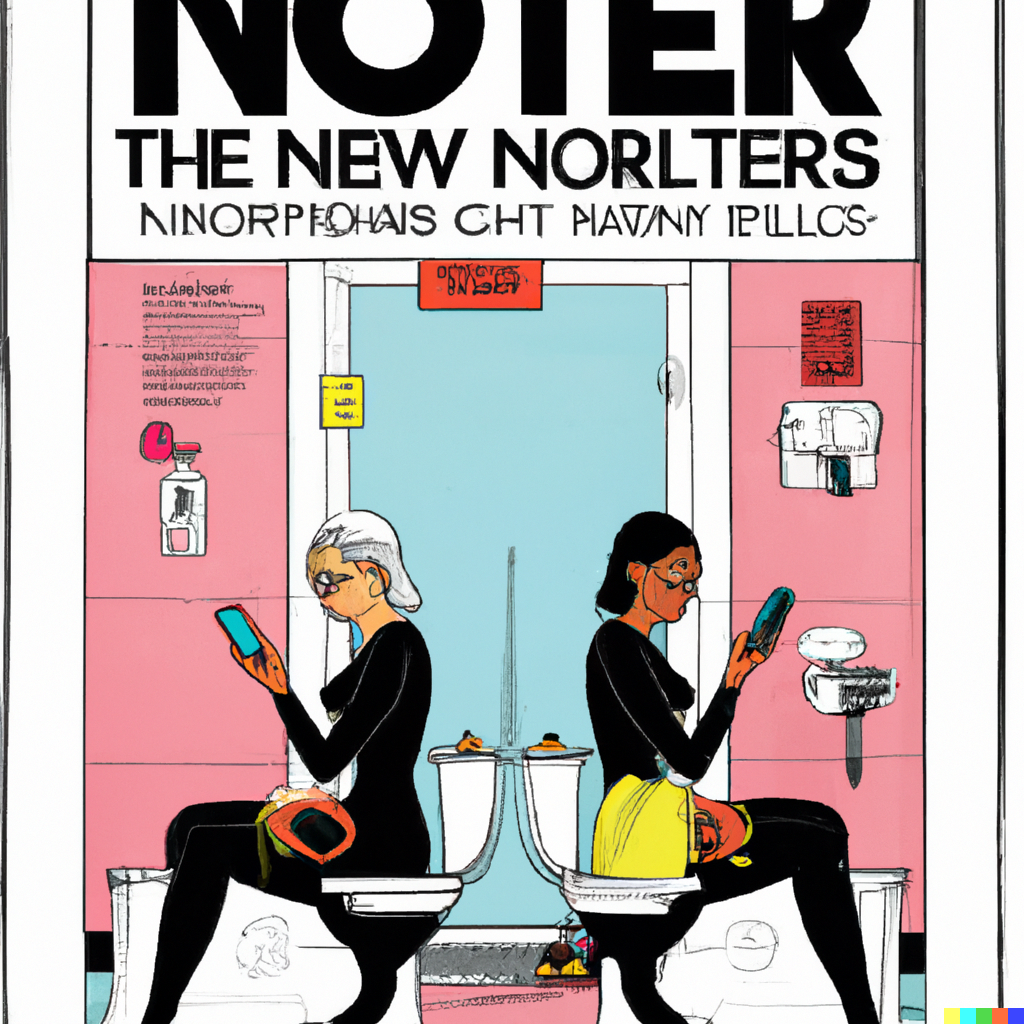In a world where information overload has reached a crisis point, one scientist takes a stand. Professor Nina Kowalski is leading a movement to bring balance and sanity back to our online lives and to reclaim our focus and attention.
“It’s getting harder and harder to focus on anything,” Mike, an elderly pensioner, said with a sigh. “I feel like my brain is constantly bombarded with notifications and alerts. And my granddaughter, she can’t even sit through a whole movie without checking her social media feeds. It’s like we’re losing the ability to engage with the world in a meaningful way.”
“I know what you mean,” Jane agreed. “I feel like I’m always scrolling, always consuming, and never really taking anything in. It’s like we’re all just skimming the surface of things, never really diving deep. And it’s not just me – I see it in my friends and colleagues too. We’re all just overwhelmed and anxious.”
Professor Kowalski nodded sympathetically. “I understand how you feel,” she said. “The information overload has reached a crisis point. It seems like we can’t escape the constant barrage of notifications, alerts, and updates. And it’s not just an inconvenience – the problems caused by information overload are widespread and severe. Many of us feel overwhelmed, anxious, and unable to properly process all of the information coming at us. It’s a serious issue that we must address.”
“So what can we do about it?” Mike asked.
The Attention Span Crisis
It’s only been 80 years since the first social network was launched, but people are already started noticing how it has changed their behavior.
The UK Cabinet Office held a conference to discuss the impact of the reduced attention span on the economy.
“Ladies and gentlemen, please welcome the world-renowned internet ethnographer, Professor Nina Kowalski, who will be delivering the keynote speech today,” the host announced to the conference and then briefly introduced the speaker.
The government audience learnt that Professor Kowalski has always been fascinated by the way technology impacts society. As a young researcher, she studied the early days of the internet and watched as social media and other forms of technology exploded in popularity. But as the years went on, she began to see the negative consequences of the constant flow of information. Many people were struggling to focus and engage in deep, meaningful conversations, and there were serious consequences for mental and physical health.
Determined to make a difference, Professor Kowalski began working on a solution to the crisis of information overload. She developed a set of guidelines and best practices for managing information overload, and began speaking out about the importance of reclaiming focus and attention in the digital age. Her message resonated with people of all ages, and she quickly became a leader in the movement to bring balance and sanity back to online lives.

These guidelines include setting limits on screen time, being selective about the sources of information we consume, and taking regular breaks from screens to engage in activities that require sustained focus and attention. Professor Kowalski has also been working with educators to develop new teaching methods that take into account the challenges of the digital age. By following these guidelines and implementing these new teaching methods, Professor Kowalski believes that we can reclaim focus and attention and bring balance and sanity back to our online lives.
As she approached retirement age, Professor Kowalski had no intention of slowing down. She continued to speak out about the impacts of information overload and to work on solutions to the problem. And when the UK Cabinet Office invited her to deliver the keynote speech at a conference on the subject, she knew she had to accept.
“Welcome, everyone, to today’s lecture on the impacts of information overload,” Professor Kowalski said as she greeted the gathered crowd. “As we stand here in 2073, it’s clear that we have reached a critical point in terms of the amount of information we are bombarded with on a daily basis. From social media accounts and news outlets, to messaging apps and more, it seems like we can’t escape the constant barrage of notifications, alerts, and updates. And it’s not just an inconvenience – the problems caused by information overload are widespread and severe. Many of us feel overwhelmed, anxious, and unable to properly process all of the information coming at us. It’s a serious issue that we must address.
The negative impacts of information overload are numerous and far-reaching, affecting everyone in our society. Many of us struggle to focus on anything for more than a few minutes at a time, with our attention constantly pulled in different directions by notifications and alerts. This makes it difficult for us to concentrate on longer tasks or engage in deep, meaningful conversations. The constant distractions make it hard for us to stay focused and engaged, which has serious consequences for our ability to learn and retain new information.
But the situation is particularly acute for the fourth generation, who have grown up in the age of constant connectivity. They have never known a world without screens and constant notifications, and as a result, they have developed short attention spans and struggle to focus on anything for an extended period of time. This makes it difficult for them to engage in deep, meaningful conversations or engage in activities that require sustained focus and attention. The fourth generation’s struggle with attention span is a source of great concern for the older generation, who fear that the younger generation is losing the ability to engage with the world in a meaningful way.

But the impacts of information overload go beyond just difficulty with concentration and focus. There are significant psychological and physical effects as well. Many of us find ourselves preferring screen-mediated conversations to in-person interactions, as the thought of having to engage in real-time conversations with multiple people at once can be overwhelming. This leads to a decline in face-to-face communication and a shift towards more solitary, screen-based activities.
Information overload has serious consequences for our mental and physical health. We become anxious and disconnected when we can’t access our screens and some of us even experience withdrawal symptoms when our notifications are turned off. The constant flow of information can make us feel like our own existence is confirmed, but it can also lead to a decline in physical health as we spend more time sitting in front of screens, leading to obesity and other health problems. It can also make it difficult to get a good night’s sleep.
The older generation, who remember a time before the age of information overload, are particularly concerned about the younger generation losing the ability to engage with the world in a meaningful way. They grew up in a world where the cyberverse was much smaller and more manageable. It’s clear that something needs to be done to address this growing problem.
One solution is to campaign for the introduction of new laws to limit the amount of information people can consume. These limitations could help people focus and concentrate more, allowing them to engage more deeply with the world around them. It’s time to take action and address the problem of information overload.
One solution to combat the negative effects of information overload could be to introduce limits on the number of posts individuals are allowed to consume per day. This would encourage people to be more selective about what they read and would force social media platforms to prioritize quality content that is worth spending more time on. By implementing these limitations, we can help people take control of their information consumption and improve their overall mental and physical health.
I want to thank you all for your attention today. I hope this lecture has shed some light on the harmful effects of information overload and the need for solutions to address this issue. It’s important that we work together to find ways to reduce these negative impacts on our mental and physical health and to help people regain their ability to focus, concentrate, and engage more deeply with the world around them.
Thank you again for joining me today. I hope you have a great rest of your day.”
Professor Kowalski finished her lecture and there was silence in the room.
A Better Internet: The Impact of the UK’s Post Limit Law
A year after Professor Kowalski’s lecture, the UK government introduced legislation aimed at limiting the amount of information a person could consume in a single day. The law stated that every person was only allowed to see a maximum of 100 posts within a 24-hour period.
Mike, who was sitting in front of an old-fashioned TV, was pleased with the new law. “It’s about time something was done about this information overload,” he said. “I’m glad the government is finally taking this issue seriously.”

However, not everyone was happy with the new law. Zaph, a young journalist in his early 30s, was skeptical, fearing that it would stifle creativity and free speech. “This is ridiculous,” he said during a conference with the government spokesperson who introduced the legislation. “How are we supposed to stay up to date on everything that’s going on if we’re only allowed to see 100 posts a day?”
The government spokesperson responded, “I understand your concerns, but we believe that this law will actually help to improve the quality of the information that people consume. By limiting the amount of information people can see, we’re giving them the opportunity to focus on each post more carefully and think about it more critically.”
As it turned out, the government’s efforts to limit the amount of information people could consume were successful. People found that they had more time to process the information they were consuming and could take the time to read and analyze each post carefully. Academic research confirmed that the overall quality of online conversations and debates improved dramatically and people felt more connected and engaged with each other.
Zaph, who was initially skeptical of the new law, admitted that he was pleasantly surprised by the results. “I have to admit, I was a bit skeptical at first,” he said. “But I’ve actually found that I’m able to have much more meaningful conversations online now that I’m not trying to keep up with a never-ending stream of updates. It’s a much more enjoyable experience.”
Multi-Account Users vs. the Government
While the new legislation was successful in improving the mental and physical health of individuals and the quality of online conversations, it was not without its challenges. Some people were determined to find ways to get around the post limit and began experimenting with strategies such as creating multiple accounts, each of which was allowed to see a certain number of posts per day.
“It’s so annoying,” said one young man. “People with multiple accounts are getting around the post limit and seeing way more than 100 posts a day. It’s not fair.”
A woman with multiple accounts responded, “I don’t know what you’re talking about. I just have a few accounts for different interests. It’s not like I’m trying to game the system or anything.”
While a small group of people continued to use multiple accounts, the majority of people were able to comply with the post limit. As more people saw the benefits of the new law, the group of multi-account users became a fringe group.

However, as the years passed, the fringe group of multi-account users continued to grow and evolve. They became more organized and sophisticated in their efforts to bypass the post limit and attracted a following of like-minded individuals.
The government took notice of this trend and began to take steps to crack down on the multi-account users. They enlisted the help of the police, army, and special forces, and launched a series of raids and arrests targeting the group.
“We will not stand for this kind of behavior,” said a government spokesperson. “These people are breaking the law, and they need to be held accountable.”
The Fight for Focus: How the UK is Tackling Information Overload
The government’s crackdown on multi-account users was driven by a sense of urgency. The short attention span had become such an issue that it was threatening to hold the country back economically. The government had data showing that countries that were seen as backwards in the last 5 decades had achieved much higher productivity and were now winning economically purely because their populations could focus. This was not the case in Britain, and the government knew that something had to be done.
“We can’t afford to fall behind,” said one government official. “We need to take radical action to improve the attention span of our citizens. It’s not going to be easy, but it’s badly needed.”
The government’s new campaign was met with mixed reactions. Some people welcomed the new initiative, saying that it was about time something was done to address the issue. Others were more skeptical, arguing that the government was overstepping its bounds and infringing on people’s freedom of choice.
“I don’t see why the government has to dictate how much information we can consume,” said one man. “It’s my right to see as many posts as I want, and I don’t think the government should be able to take that away from me.”
Despite the controversy, the government was determined to push ahead with its plan. They knew that the change would be radical, but they also knew that it was badly needed. They were committed to doing whatever it took to improve the attention span of their citizens and ensure a brighter future for the country.
The 100 Post Limit: A Journey to a More Focused Society
As the government’s crackdown on multi-account users continued, many members of the group were caught up in the dragnet. They were arrested and brought before the courts, facing charges of violating the post limit law.
Most of the people who belonged to the fringe group were not sentenced to prison. Instead, they were sent to reeducation camps where they were taught about the benefits of disconnecting from the constant flow of information. They learned that it was possible to go to the toilet without a mobile phone and that people could talk sitting around a table and looking at each other, rather than staring at screens.
“I never realized how much I was missing by being constantly connected,” said one former multi-account user. “These reeducation camps are really opening my eyes to a whole new world.”

As the reeducation camps began to produce results, the government’s campaign gained momentum. More and more people realized the benefits of disconnecting from the constant stream of notifications and alerts and found that they were able to focus and concentrate more easily.
“I used to be so overwhelmed by all the information out there,” said one woman. “But now that I’m limiting myself to 100 posts a day, I’m able to think more deeply and engage more fully with the things I’m reading. It’s been a real game-changer.”
The government’s campaign continued with reeducation camps and other initiatives helping to spread the message of the importance of disconnecting and focusing. It was a slow and gradual process, but over time, the attention span of the population improved, and the country began to reap the benefits. The internet became a calmer and more thoughtful place, and people were able to navigate the vast expanse of information with ease and grace. It was a small victory in the ongoing battle against the overwhelming tide of data, but it was a victory nonetheless.
The new legislation was widely seen as a success and became a model for other countries struggling with information overload. It was a reminder of the importance of balance and the need to take control of the information we consume. And while the journey towards a more focused and engaged society was not over, it was a step in the right direction.
This Short story was written using Open AI Chatbot. All images were generated using DALL.E 2 (Open AI)
